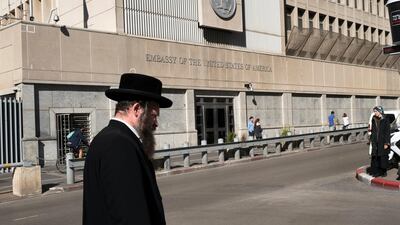The focus in president Donald Trump's statement on the Israeli-Palestinian peace process, expected on Wednesday, is on whether he recognises Jerusalem as Israel’s capital, upending seven decades of US policy.
The decision would come five days after a Congressional deadline for Mr Trump to issue presidential waiver to prevent the embassy from being moved from Tel Aviv to Jerusalem, required every six months since 1995. No decision has been made, according to Mr Trump's senior aide overseeing the peace process, Jared Kushner, and his national security adviser HR McMaster, and the administration appears to be weighing several options.
A US official told The National that Mr Trump will most likely issue a waiver on moving the embassy, but has to yet decide on recognising the city as Israel's capital.
Aaron Miller, the vice president for new initiatives at the Woodrow Wilson Centre who has dealt with the peace process while serving in six previous US administrations, told The National "there isn't one single US national interest that should prompt the president to move the embassy or declare Jerusalem the capital" at this time.
He predicted that Mr Trump would sign the waiver “but he may announce a change in policy to declare Jerusalem or West Jerusalem as capital [of Israel]”.
Mr Miller said the policy change could have three motivations.
First, to “throw lot of honey in Israel’s way, in an effort to get concessions from the Israeli government when eventually a peace initiative is put in place”, he said. Second, it could be an attempt by Mr Trump to “demonstrate that he is the most pro-Israel president since Harry Truman", who served from 1945 to 1953.
Or it could “just be Mr Trump being frustrated with the status quo, and that he doesn’t want to sign the waiver again, while fulfilling a campaign commitment”.
Mr Miller said it was hard to predict the impact on the Arab street of such change in policy, but that armed Palestinian groups such as Hamas and Islamic Jihad could exploit the fury to incite violence.
_______________________
Read more:
Arab League: Moving Israel's US embassy to Jerusalem will boost 'fanaticism'
The row over Jerusalem gives American Jews a tough choice
Palestinians try to rally world leaders against Trump Jerusalem move
_______________________
For Robert Satloff, the executive director of the Washington Institute for Near East policy, such reactions for simply declaring Jerusalem the Israeli capital may be overblown.
"My general view is that most Arabs probably wonder why Israel's leading ally doesn't already recognise its capital; difficult to imagine this is a major development in a region wracked by such violence and change," Mr Satloff told The National.
“There is a wise way for the president to take this step and a needlessly provocative way, by repairing the historic wrong and recognising a reality that has been the case since 1949 — without getting into details of recognising any particular municipal boundaries of the city,” he said.
Instead, the "US should affirm its willingness to assist the parties to negotiate a final status agreement on Jerusalem, as they have promised, and should affirm its recognition of Jordan’s special rights in the holy sites, which is not affected by this announcement”.
The US Congress has already recognised Jerusalem as capital of Israel and mandated in 1995 to move the US embassy from Tel Aviv to Jerusalem by 1999. Since then every US president has issued waivers to block such move.
For former Palestinian negotiator Ghaith Al Omari, however, there is no diplomatic way that Mr Trump can announce such decision.
“No matter how diplomatically finessed it may be, politically it will cause trouble,” said Mr Al Omari, a fellow at the Washington Institute. “All political actors are competing who will reject it more vociferously: the Palestinians will force the Arabs to reject it via the Arab League, the Jordanians are very worried, Turkey already rejected it and there are even reports that [Iraqi leader] Moqtada Sadr asked his followers to take to the streets."
He said the major question "is whether it will lead to disturbances on the ground in Palestine and in Arab countries”.


